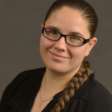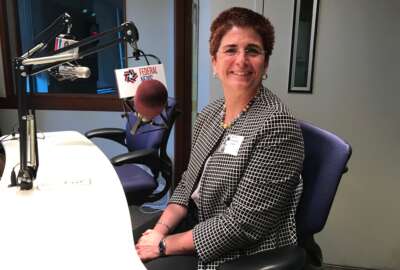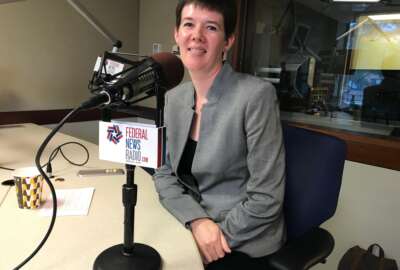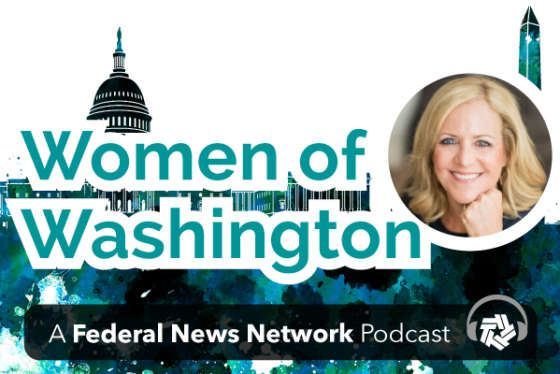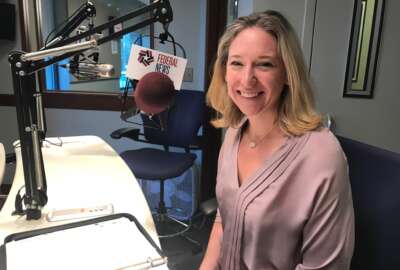
Power comes from complex planning
Gigi Schumm welcomes Brenda Smith, executive assistant commissioner at the Customs and Border Protection Office of Trade, to talk awards, leadership style and the...
Best listening experience is on Chrome, Firefox or Safari. Subscribe to Women of Washington’s audio interviews on Apple Podcasts or PodcastOne.
Success comes from always being a step ahead.
On this episode of Women of Washington, Gigi Schumm welcomed Brenda Smith, executive assistant commissioner at the Customs and Border Protection Office of Trade. Smith was also a finalist in the 2017 Samuel J. Heyman Service to America Medals (SAMMIES).
CBP is responsible for protecting the borders, including trades between countries. In her current role, Smith is responsible for ensuring that goods coming in and out of our borders meet certain laws and regulations.
“One of the roles that we play is to make sure [agencies, consumers] can depend on the flow of goods from wherever they’re coming from,” Smith said. “The second piece of economic prosperity is really about U.S. manufacturers that want to compete on a global scale, but need to be sure that they are on a level playing field.”
In other words, making sure American companies are able to compete with goods and services from other countries. But it’s more than that. It’s also about making sure everyone involved is on the same page, including the different players within U.S. borders.
That notion is what made her team work so diligently on what is known as the Single Window project. It was the development and implementation of this single, electronic portal for exporters and importers to submit information on any shipments scheduled to cross U.S. borders, that led to Smith’s SAMMIES nomination.
“Instead of a company being asked for data three or four times from three or four different agencies in their proprietary systems, we put it all in one and that allowed us to really remove a lot of duplication,” she said. “And it allowed us to give an answer back to the private sector who wanted to know what was happening to their shipments rather than just being held up at customs.”
Challenges such as culture change, IT modernization and complex software development stalled the program in its infancy, but the team was ultimately able to overcome them. Bringing everyone together was difficult, including voices of 47 agencies, but Smith said they were determined to come to an agreement.
The team found success because of two factors, Smith said:
- Everyone worked together in the same room, as often as possible.
- Complex planning
“If you didn’t make sure that you were doing integrated planning, you always forgot something or something fell through the cracks,” she said.
Behind the scenes
Smith was raised in the hustle and bustle of the Washington metropolitan area. Her father worked for the National Weather Service as she was growing up. So, when she came to D.C. after college, she wasn’t a stranger to the idea of government. In fact, she already knew that she would probably work for the government.
“My dad, as I was at a key crossroads, said to me, ‘If you want to go somewhere that you have more decision-making ability and greater opportunity to make an impact, working for the federal government is the place to be, [but] you need to pick the agency carefully’,” she said.
She’s held many different positions in federal and local government, including working on Capitol Hill and for the Maine Department of Treasury. It may seem like life has taken her in a linear path — but Smith will correct you. She will tell you about the nine different jobs she’s had in five offices, including the last dozen or so years in trade.
“I’ve led the strategic planning effort for the agency. I’ve worked in the Office of international Affairs. I started out as a budget analyst. So I’ve done a lot of things,” she said. “I joke that I bore easily. But what I really think is important is diversity of skills.”
She said it’s important in your career to gather different skills. Sometimes that comes from moving from place to place, or job to job. How did she decide when to move on? She has a simple two-criteria policy for agreeing to a job: Is she going to learn something new and is she going to be challenged?
Certain tradeoffs
Growing always requires a certain level of sacrifice.
“There are the times when you really come to a fork in the road and often it’s best to take the road not previously traveled. You learn more, you have the opportunity to look at situations with fresh eyes and you have the opportunity to bring your unique set of skills and capabilities to bear,” Smith said. “And the more you can do that, I think when you look back at your life or look back at your career, there’s tremendous sense of satisfaction from taking on those opportunities as well as being able to solve challenges.”
Being able to understand what is coming your way or what is around the corner is important in leadership. Smith said taking the time to gather information and complete analyses on stakeholders and agencies involved has been her key to success.
She said there are always tradeoffs in life — whether working in the federal workforce, or not — and it always helps to make sure you are thinking about them well in advance.
The two scarcest resources we have as humans are our time and our energy, Smith said. It’s never a problem to ask for help when life gets a little hard.
“I’m a big fan of outsourcing,” she said.
Copyright © 2025 Federal News Network. All rights reserved. This website is not intended for users located within the European Economic Area.
Steff Thomas is a digital editor at Federal News Network.

